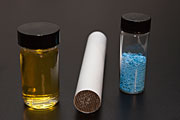- Number 352 |
- December 12, 2011
Novel catalyst technology helps convert diesel to syngas

Incorporating active metals
into the crystal structure of
pyrochlore minimizes catalyst
poisoning.
Methods for generating synthesis gas from simple hydrocarbons such as methane routinely involve the use of a catalyst, but the high sulfur and aromatic content of fuels such as diesel poses a major challenge, since these components can deactivate conventional catalysts. Unfortunately, no economically feasible reforming catalyst is available for converting diesel and coal-based fuels into hydrogen-rich synthesis gas necessary for use in SOFCs.
To minimize catalyst poisoning while maintaining high activity, researchers at DOE's National Energy Technology Laboratory (NETL) developed the novel idea of incorporating active metals into the crystal structure of a thermally stable material: pyrochlore. The unique crystalline structure of pyrochlore allows for chemical modifications tailored to specific fuels and reaction conditions.
Development of this technology has resulted in two patent-pending inventions, one for utilization of pyrochlore catalysts in hydrocarbon reforming processes and the other for a method of optimizing the performance of pyrochlore catalysts for a particular application or specific operating condition. Together these inventions help overcome the limitations of current catalysts by efficiently reforming diesel fuel while maintaining thermal stability and resistance to sulfur, aromatics, and carbon formation.
The commercial potential of these inventions has recently been recognized through the execution of an exclusive licensing agreement with the newly-formed Pyrochem Catalyst Corporation. This agreement marks the first time that an NETL-licensed technology has been used as a basis for the creation of a start-up company. The successful commercialization of pyrochlore-type catalysts for reforming hydrocarbon fuels may lead to the creation of high-technology jobs.[Linda Morton, 304.285.4543,
Linda.morton@netl.doe.gov]
